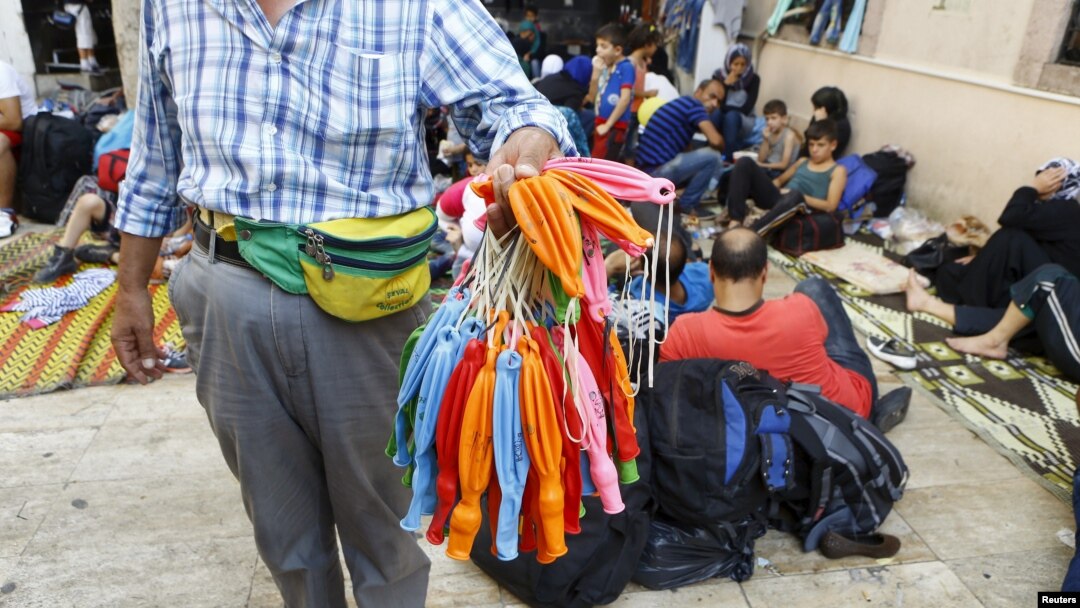Twenty-year-old college students from Syria, Omar and Monar, met their first scammer before they left the airport in Turkey. A man sold them what they thought was a SIM card so they could use their smartphones in Turkey.
He took $35 from the pair, and the card was fake. SIM cards here cost $20.
A few hours later, we met the two at a mobile phone shop after they overheard my colleague, Shadi, speaking Turkish to the store clerk, and Syrian Arabic to his friend.
“You speak Turkish, can you help me?” said Omar, leaning over the counter.
The five of us then headed together to Basmania, a run-down neighborhood in this resort city where refugees convene to meet smugglers. The area is buzzing with anticipation as people spend their final days preparing for a late night trip across the sea in a rubber boat they hope will get them to Greece.
Monaf laughed when we arrived in Basmania a few minutes later.
“I thought I came to Turkey, but this looks like Syria,” he said, referring to the scores of Syrian men drinking tea and smoking.
Pirate bar
Part market, part café, this section of Izmir reminds me of rusty bars in old pirate movies. Odd items are for sale, like brightly covered duct tape to wrap money and cell phones in after they are stuffed in balloons. People openly talk about smuggling with a nautical theme. They discuss sea routes, currents and when the winds will change.
And like the fictional pirates, the travelers mostly stick with their groups.
Minutes after we arrive, Shadi notices an old friend, Modar. He had taken notice of Modar’s arrival in Istanbul on Facebook a few days before and was wondering if we might see him in Izmir.

FILE - A street vendor sells balloons which can be used to waterproof mobile phones in the backyard of a mosque filled with Syrian refugees waiting to sail to Greek islands, in Izmir, Turkey, Aug. 10, 2015.
“His mother is from my area,” Modar told me, looking delighted to see Shadi. But Modar said he was keeping the other old friends he has met in Basmania at arms-length. For instance, he said, he hasn’t seen Aboud in years and he doesn’t know how he may have changed from the war.
“We can’t trust anyone here,” he said. “Even people you knew in the past.”
Only chance
Shadi however, couldn’t be a threat because he was one of the few Syrian people in the area without thousands of dollars on their person, carrying every item he owned in a bag. He wasn’t in the process of risking his life and everything he owns for the chance to get to Europe.
For most of the travelers in Basmania, if their possessions or money are stolen or scammed, the person is left stranded with literally nothing but a broken heart. Refugees here usually say their biggest fears are being robbed by a smuggler, being arrested and sent back, or drowning at sea. Usually in that order.
But the sheer improbability of raising that kind of money twice has everyone looking sideways at each other, even young Monaf, who had just arrived a few hours before. If he does not get to Germany on this trip, he said, he fears Europe will close its doors before he can raise the money again.
“We are selling our houses and cars to come here,” he said. “I didn’t sleep at all on my two-day trip here.”
“Why didn’t you take a bus and plane from Damascus?” I asked.
Monaf pointed to his bag. I look surprised. Wasn’t the bag in the overhead bin?
“The bag is all I have, plus the clothes on my back,” he said. “My eyes are always on it.”
Reunited
This level of nerves is common around here, but Omar, Modar’s best friend, soon returned to the table looking pleased.
“I just saw an old friend with a bag,” he said. “A bag means he’s going to Greece.”
He hadn’t seen his friend since the fifth grade, so he wasn’t sure of the guy’s name. “He was so lazy,” Omar said, smiling, “But he was a good friend.”
Until everyone is safely settled, Modar prefers to trust mainly his brother, he said.
“Maybe when we live in a safe place we’ll all be happy again,” he said . “But if I lose the money, I will have to go back to Syria.”

